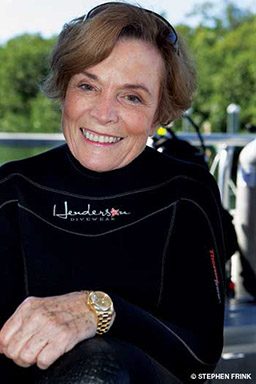Hometown: Gibbstown, N.J.
Age: Timeless
Years Diving: 58
Favorite Destination: The ocean
Why I’m a DAN Member: “No diver should ever leave home without it, and I’m a diver!”

Dr. Sylvia Earle’s credibility and charisma combine to make her an extraordinarily high-profile advocate for the ocean environment, a sort of “rock star of marine conservation.” In her storied career, Earle has evolved beyond the academic to the experiential, spearheading more than 100 scientific explorations and spending more than 7,000 hours underwater.
Her passion is ocean advocacy, both for the ocean itself and the creatures that inhabit it.
Her fascination with nature seems to have been born in her. As a child she was obsessed with all things wild, as she and her brothers explored the New Jersey shoreline. Her curiosity did not diminish when her family relocated to the Gulf Coast of Florida; rather, it expanded to include the underwater world.
It was during her college years at Florida State University that Earle learned to dive, initially as a research tool. Scuba was new then, and much of what was known of the seafloor came by interpolating what was washed or dragged ashore. With time underwater came greater understanding and deeper appreciation. With a specialization in botany and two advanced degrees from Duke University, she began what has become a lifelong passion to understand the complex symbiosis of the creatures and vegetation that anchors marine ecosystems. By recognizing an environment in balance, she intuitively sees the forces that may disrupt the harmony of the reef and pelagic life.
Earle credits her transition from “ivory-tower scientist” at Harvard, the University of California at Berkeley and the California Academy of Sciences to celebrity scientist to her 1970 involvement with the Tektite II project. Earle was invited to lead an all-female team of aquanauts, with whom she spent two weeks underwater studying marine life in the U.S. Virgin Islands. The press was curious, almost fixated on the fact that five women had not only made “a splash” in a traditionally male-dominated field, but had managed to get along for two whole weeks. A ticker-tape parade and White House reception followed their adventure.
Earle saw the Tektite mania as an opportunity to expand the voice of science. She took inspiration from the words of Thomas Huxley, who said, “Science has fulfilled her function when she has ascertained and enunciated truth.” In other words, it’s not enough to establish fact; it must be shared. National Geographic encouraged Earle to work with the press as well and coached her to be comfortable telling a story. When Earle did speak with the press that first time, she told her story with such eloquence and conviction she was soon in demand as a public speaker, in person and on television. The ocean had its spokesperson.
“Fish can’t speak, and they can’t vote,” said Earle. “Our future generations can’t either. Someone has to speak for them and through my personal observations I’ve seen how fast things have changed. So much is being lost so quickly.
“Over hundreds of millions of years we have a planet that evolved into an efficient and functional ecosystem. Over the past few decades we’ve managed to change things. Dramatically. It is blindingly clear that if the ocean is in trouble, so are we. We are closing options faster than we can invent ways to respond to consequences of closing those options.”
Earle has spent a lifetime trying to keep our options viable. Her research has taken her around the world and kept her in the company of some of the brightest scientific minds of our time. She has documented, educated and influenced millions through her films, books, documentaries and lectures. She has won countless honors and awards for her work, and it continues today in her position as Explorer-in-Residence with the National Geographic Society.
When asked whether her research has proven divers to be part of the oceans’ problems or the solution, her answer is swift. “It makes me furious when governments or institutions want to restrict diving, as if diving harms the ocean,” she said. “What harms the ocean is ignorance. Divers are not likely to be ignorant and are vitally aware of how much of value there is to protect. After all, if half our coral reefs are dead or in decline, half remain alive and vibrant. We have much to celebrate and much to preserve.”
Career Highlights
Often described as “legend” and “hero,” Sylvia Earle has earned the many accolades awarded her. Consider that Earle has:
- In 1979, walked untethered on the sea floor for two and a half hours at a depth of 1,250 feet. The feat was accomplished in a “JIM suit,” a diving suit pressurized to one atmosphere, and Earle remains the only human to have done it
- In 1980, teamed with engineer Graham Hawkes to found Deep Ocean Engineering and Deep Ocean Technologies, companies that design and build undersea vehicles
- Received more than 100 national and international honors, including admission into the National Women’s Hall of Fame and the American Academy of Achievement, medals from the Explorers Club and the National Wildlife Federation and the 2009 Technology, Entertainment and Design (TED) Prize for her proposal to establish a global network of marine protected areas
- Authored more than a dozen books on the ocean and ocean conservation for readers of all ages
- Recently led the Google Ocean Advisory Council’s team of 30 scientists to provide guidance and content for the “Ocean in Google Earth” project
Explore More
© Alert Diver — Q1 Winter 2011

